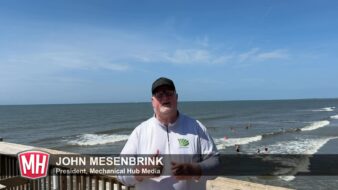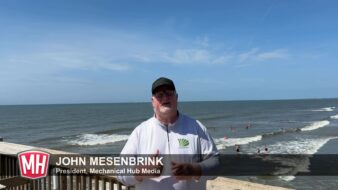Global public health organization NSF International creates Hazard Analysis and Critical Control Point (HACCP) training to reduce risk of microbial, chemical and physical hazards in building water systems
Global public health organization NSF International has launched a new Building Water Systems Hazard Analysis and Critical Control Point (HACCP) training program for water systems professionals. The training will help safeguard against microbial, chemical and physical hazards associated with premise plumbing, cooling towers and other water systems in buildings.
Training courses will be held in multiple cities across the U.S. Facility managers, water treatment, distribution and plumbing engineers, and occupational safety professionals can register here: www.nsf.org/training-education/all-courses/category/water-wastewater.
Every year, tens of thousands of preventable injuries and deaths are caused by exposure to microbial, chemical and physical hazards from building water systems. Although municipal water is treated and distributed in accordance with U.S. Environmental Protection Agency (EPA) regulations and is safe for its intended use, microorganisms can enter plumbing systems, attach to the inside surfaces of pipes and equipment to form a biofilm and grow to much greater numbers. Potentially pathogenic microorganisms can then be released into the environment as infectious particles that can pose a threat to human health.
Applying HACCP principles to building water systems enables water systems professionals to prevent contamination from pathogenic microorganisms and other chemical and physical hazards by providing a framework for identifying potential hazards and specifying measures for control that ensure the safety of a building’s water supply.
“The application of HACCP to building water safety is invaluable for protecting the overall health, safety and well-being of the public. Such programs have proven effective for controlling the growth and dispersal of harmful pathogens and this training program will equip water systems professionals with the knowledge they need to apply these principles to their own building water systems,” said Clif McLellan, Vice President of NSF International’s Water Division.
Although HACCP principles are best known for their successful use in food safety applications, they have also emerged as a solution to water safety issues. HACCP-based water safety programs developed by the World Health Organization have proved effective for preventing waterborne disease associated with building water systems.1 In 2010, a HACCP water management program was developed and implemented at the Mayo Clinic in Rochester, MN, yielding significant improvements in building water system safety (Krageschmidt, et. al., 2013).2
The NSF HACCP for Building Water Systems training courses will be taught by William F. McCoy, Ph.D. and Aaron A. Rosenblatt, water systems experts with more than 69 years of combined industry experience:
- William F. McCoy, Ph.D., is Co-Founder and Chief Technology officer of Phigenics LLC, a solutions provider for problems associated with building water systems. Bill has published more than 100 scientific articles and 8 book chapters on topics involving water systems and technologies, including a book entitled “Preventing Legionellosis,” which was published by the International Water Association. He has also developed 29 U.S. patents for new analytical diagnostics and technologies widely used for cooling tower treatment, received the International Water Association Medal for Outstanding Contribution to Management and Science (Berlin 2001), Inventor of the Year Award from the Intellectual Property Law Association (USA 2001), Grand Prize Technical Innovation Trophy from the SUEZ Group (Brussels 2000), Governor’s Pollution Prevention Award from the State of Illinois (USA 1999), and the R&D 100 Award from Research and Development Magazine (USA 1998).
- Aaron A. Rosenblatt is a Principal of Gordon & Rosenblatt, LLC, an independent consulting firm specializing in oxy-halogen chemistry and chemical disinfection with an emphasis on public drinking water supplies and microbial risk management in building water systems. Mr. Rosenblatt is the inventor of more than 20 U.S. patents and author of a number of scientific and technical papers, primarily on drinking water disinfectants, disinfection chemistry and related EPA regulations under the Safe Drinking Water Act. Mr. Rosenblatt has served on the Board of the International Ozone Association-Pan American Group (IOA-PAG), as a member of the American Water Works Association (AWWA) Disinfection and Disinfectants Committees and the Microbial and Disinfection By-Product (M/DBP) Technical Advisory Workgroup during regulatory negotiations for U.S. EPA M/DBP Rule II.
Companies seeking more information about the HACCP training program can contact americas@nsf.org or visit NSF’s water programs webpage. You can also email europe@nsf.org, asia@nsf.org, brasil@nsf.org, and info@nsf.org.cn (China) for additional information.
Editor’s note: To schedule an interview with an NSF International Water Expert, contact Kelly Ingerly media@nsf.org or +1 734-827-6850.
About NSF International: NSF International is a global independent organization that writes standards, and tests and certifies products for the water, food, health sciences and consumer goods industries to minimize adverse health effects and protect the environment (nsf.org). Founded in 1944, NSF is committed to protecting human health and safety worldwide. Operating in more than 150 countries, NSF is accredited by the American National Standards Institute (ANSI) and is a Pan American Health Organization/World Health Organization Collaborating Center on Food Safety, Water Quality and Indoor Environment.
NSF led the development of the American National Standards for all materials and products that treat or come in contact with drinking water. In 1990, the U.S. EPA replaced its own drinking water product advisory program with these NSF standards. Today, all major plumbing codes require certification to NSF standards for pipes and plumbing components in commercial and residential buildings. NSF International is accredited by the American National Standards Institute (ANSI).
Additional NSF services include management systems registration through NSF-ISR; sustainability standards development, claims and product verification through NSF Sustainability; food safety and quality programs through the NSF Global Food Safety Division; and testing and certification programs for bottled water and beverages, dietary supplements and consumer product industries.




Join the conversation: